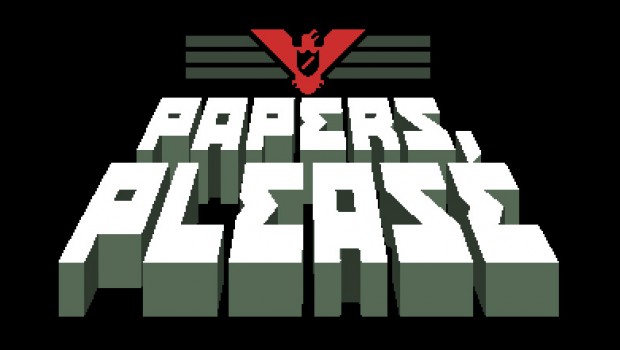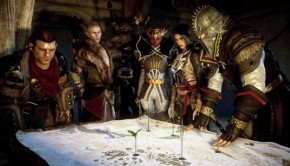Papers, Please: Games Without Frontiers
Brutalist architecture is a style of architecture most commonly associated with the failed socialist and communist states of Eastern Europe and the former USSR. Few people remember those concrete structures fondly; Prince Charles once quipped that “at least when [the Luftwafte] knocked down our buildings, it didn’t replace them with anything more offensive than rubble.” Most Britons agreed with him. But the fact of the matter is that Brutalist buildings weren’t built to be loved. They were built to be respected, maybe even feared. Their architects wanted to highlight the purity of their function and to strip away all ornament. Brutalism is not about your feelings.
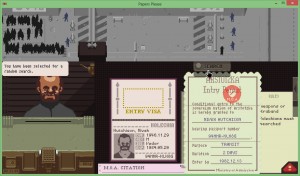 Papers, Please is a Brutalist game through and through. It casts you as a border agent in the fictional country of Artstotzka, 1982. Citizens and foreigners approach you and ask to enter Arstotzka. You examine their paperwork, ensuring everything is consistent with the Ministry of Admission’s official rulebook and that there are no forgeries or inconsistencies. This takes place as a Phoenix Wright-style cross-examination of entrant, paperwork, and rulebook. Once you’ve made your judgement, you can let them in, turn them away, or detain them for questioning. That’s it: again and again, day after day. It’s tedious, repetitive, and boring – yet an utterly compelling gameplay loop. Finding inconsistencies in people’s stories is strangely rewarding, and it’s easy to take a perverse satisfaction in turning someone away after finding a one-letter typo between their passport and work visa. Is it “fun”? Hard to say. But like the coffee mug says, “I do [X] because it feels so good when I stop.”
Papers, Please is a Brutalist game through and through. It casts you as a border agent in the fictional country of Artstotzka, 1982. Citizens and foreigners approach you and ask to enter Arstotzka. You examine their paperwork, ensuring everything is consistent with the Ministry of Admission’s official rulebook and that there are no forgeries or inconsistencies. This takes place as a Phoenix Wright-style cross-examination of entrant, paperwork, and rulebook. Once you’ve made your judgement, you can let them in, turn them away, or detain them for questioning. That’s it: again and again, day after day. It’s tedious, repetitive, and boring – yet an utterly compelling gameplay loop. Finding inconsistencies in people’s stories is strangely rewarding, and it’s easy to take a perverse satisfaction in turning someone away after finding a one-letter typo between their passport and work visa. Is it “fun”? Hard to say. But like the coffee mug says, “I do [X] because it feels so good when I stop.”
Layered on top of this “dystopian document thriller” is a harsh Cold War morality. Many of the people you meet are ordinary travelers – some legal, some not. But others force you to question your role in the greater bureaucracy. A husband’s papers are valid, but his wife’s are forged. Do you let them both through, or separate them at the border? A scared young woman fingers a man behind her in line as a sex trafficker. Do you detain him for questioning, despite his valid paperwork – and the hit the forced “error” will mean for your daily salary? Remember you have expenses: rent, food, heat. Remember you have a family: wife, son, uncle. Remember they are healthy and safe (for now).
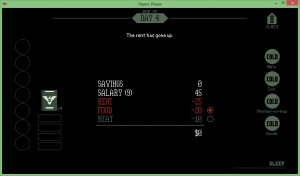 As a result, the moral choices you make are exactly that: choices. With no clear “right” or “wrong,” what you choose to do has both personal meaning and consequence. This is in sharp contrast to most games’ cartoonish “morality” systems, which simply ask you if you want to do the right thing or to be a hilarious jerk. These systems are often ridiculously skewed towards taking the high road, making any “choice” easy. Refuse the reward? Now I know you’re a great guy – take double, I insist! Even Bioshock’s Little Sisters always double back with extra ADAM for those who spared their lives. What’s the point? Anyone can be good when there’s nothing on the line.
As a result, the moral choices you make are exactly that: choices. With no clear “right” or “wrong,” what you choose to do has both personal meaning and consequence. This is in sharp contrast to most games’ cartoonish “morality” systems, which simply ask you if you want to do the right thing or to be a hilarious jerk. These systems are often ridiculously skewed towards taking the high road, making any “choice” easy. Refuse the reward? Now I know you’re a great guy – take double, I insist! Even Bioshock’s Little Sisters always double back with extra ADAM for those who spared their lives. What’s the point? Anyone can be good when there’s nothing on the line.
Yet even more insidious than skewed player rewards are morality systems that skew player experience. Bioware games, in particular, often unfold dramatically differently according to player choice. “Good” players get endless dialogue trees and shuttled into a defensive play style. “Evil” players let actions speak louder than words and solve problems with violent combat. In these games, the choices you make determine a lot more than your protagonist’s alignment – they determine the sort of game you’re playing.
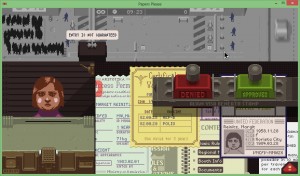 That’s why Papers, Please’s Brutalist austerity works to its advantage. No matter your choices, Papers, Please remains the same game: one where you read documents and stamp paperwork. It doesn’t matter if you decide to play as a communist stooge or a conscientious objector, a family man or an efficient bureaucrat. The way that you interact with the world is always the same: by reading documents and stamping paperwork. Most games reduce complex problems until they can fit into a simple worldview. Papers, Please keeps the problems complex and reduces the player’s available responses. “Approve” and “Deny” are totally insufficient ways to deal with the baggage people bring to your counter. But these are the only way the player can communicate with the world.
That’s why Papers, Please’s Brutalist austerity works to its advantage. No matter your choices, Papers, Please remains the same game: one where you read documents and stamp paperwork. It doesn’t matter if you decide to play as a communist stooge or a conscientious objector, a family man or an efficient bureaucrat. The way that you interact with the world is always the same: by reading documents and stamping paperwork. Most games reduce complex problems until they can fit into a simple worldview. Papers, Please keeps the problems complex and reduces the player’s available responses. “Approve” and “Deny” are totally insufficient ways to deal with the baggage people bring to your counter. But these are the only way the player can communicate with the world.
It’s beautiful and sick. The game is dehumanizing and alienating because the job is dehumanizing and alienating. The system does not care about your feelings, and everything about the game reflects that harsh truth. The cramped UI is completely insufficient for dealing with your job, forcing you to stack and shuffle documents just to find enough space to read. In one particularly mordant joke, the game lets you spend some of your meager salary on improving the processing experience – undoubtedly the first time I’ve had to choose between a TAB-key shortcut and my life. The pixel artwork is jarringly effective, and unlike most indie games, not one bit nostalgic. It’s simply there: the game had to have graphics, didn’t it?
So in the end, when someone requires fingerprinting, all you can think of is how damn long the fingerprinting process takes, and how many more steps it will be before you can Approve or Deny their application, and that means you’ll be able to process fewer applicants today, and that means you bring home less salary at the end of the day, and God forbid one of your family members take ill during the cold Artstotzkan winter! and…it’s unlikely you even noticed they were claiming political asylum. That they were fleeing from somewhere even worse than cold, communist Artstotzka. If you did notice, it was probably only as part of your job. The person in front of you is no longer a person. The person in front of you is only a problem.
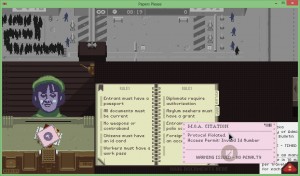 Some modern architects are reevaluating Brutalist architecture in light of what it does well: an efficient use of materials, a purity of line and form, a nearly Japanese austerity. They argue that Brutalism is unfairly maligned because of who first implemented it: crumbling totalitarian states and decaying British social service projects. Did these buildings fall into disrepair because they were ugly? Or are they ugly because they fell into disrepair? If we find those run-down buildings ugly today, let that be a slight on their creators, not the buildings. It’s possible that Brutalism is an architectural ethos like any other, and it’s only how it’s used that makes the difference.
Some modern architects are reevaluating Brutalist architecture in light of what it does well: an efficient use of materials, a purity of line and form, a nearly Japanese austerity. They argue that Brutalism is unfairly maligned because of who first implemented it: crumbling totalitarian states and decaying British social service projects. Did these buildings fall into disrepair because they were ugly? Or are they ugly because they fell into disrepair? If we find those run-down buildings ugly today, let that be a slight on their creators, not the buildings. It’s possible that Brutalism is an architectural ethos like any other, and it’s only how it’s used that makes the difference.
Is it worth playing? Gamers are notoriously fickle neophiles, constantly chasing brighter and shinier experiences. The titles that deliver sell millions, but the ones that fall short fill up bargain bins. Budgets balloon out of control in an unsustainable cycle of excess. For years, bigger and badder has been the only metric the industry had for success, but the indie revolution is creating a new set of rules. Stepping out of this self-destructive arms race lets new forms of interaction be created and explored on their own terms. Games like Papers, Please offer a hugely compelling experience that doesn’t fit into the AAA narrative. The end of this gaming Cold War is dramatically different: the only winning move is to play.

